Poetry and Feminism in the Eighteenth Century
In the 18th century, the French Revolution gave fruition to new ideas revolving around liberty, freedom, and human rights, among other values that would later be the foundation of the Age of Enlightenment. The consequent pamphlet wars between peers like abolitionists and suffragettes discussed fervently rights that not only pertained to the white man, but also women and people of color. The goal among many of these writers was universal rights despite differences in race or sex, and not many sympathized or agreed with these “radical” takes on rights.

Similarly, in the 21st century there are movements across the globe demanding different resolutions that, when summarized, also seek universal rights 25 decades later. Though slavery has been abolitioned in name, systemic racism still shackles the Black community in America from achieving opportunities mostly known to the white man. Immigration keeps families apart while Americans celebrate Cinco de Mayo, and women continue to beg for bodily autonomy and justice for assault victims. Though we are no longer engaging in pamphlet wars, we use social media and our writing to elevate our voices and the voices of those who no longer can.
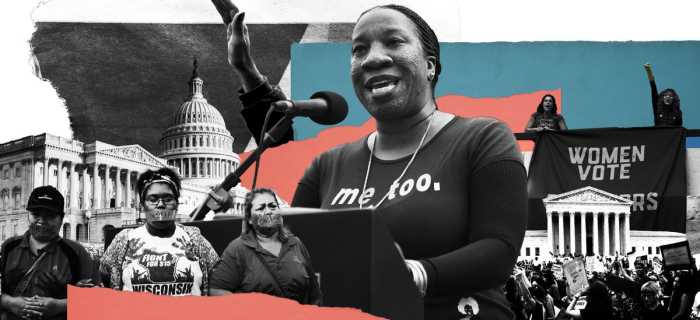
It is relevant that we analyze previous texts from the likes of Mary Wollstonecraft and Olympe de Gouges to see how far we have come three centuries later. Though we no longer use terms like abolitionists and suffragettes to identify ourselves as activists, our advocacy’s goal is not so different from the goal of 18th century writers. We must ask ourselves first and foremost what makes universal rights a “radical” ideology and most importantly, why has it taken centuries to achieve it?
To better understand our texts via an 18th century lens, we will compare Olympe de Gouges’s Declaration of the Rights of Woman and of the Female Citizen (1791) and Mary Wollstonecraft’s A Vindication of the Rights of Woman (1792) to contemporary poetry. This feminist poetry is by Shay Alexi Stewart, titled, “Song of the Prettybird”, and poet Melissa Lozada-Oliva’s “Like Totally Whatever” (inspired by Taylor Mali). Only through uplifting women’s voices can we further the feminist movement to achieve its ultimate purpose— universal rights for every man, woman, and nonbinary.
Women in Power: Education
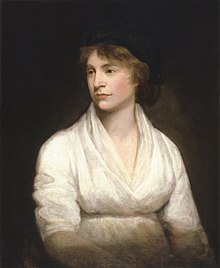
Mary Wollstonecraft (1759-1797) is considered one of the first feminists in history, as she passionately wrote what would become part of the large discourse regarding women’s rights. Her work, titled, A Vindication of the Rights of Woman (1792) was the basis for the many pamphlet responses by men and women who mocked or disagreed with Mary Wollstonecraft’s goal of universal rights. As Richard Polwhele (1760-1838) said about feminists, “… vengeance smothers all their softer charms” 1 , signifying women’s beautiful qualities end as a feminist, calling them “unsexed” in his title.
Despite all the backlash Wollstonecraft received from peers such as Polwhele and Thomas James Mathias, she stood by the importance education has for both sexes. In the Introduction of A Vindication of the Rights of Woman (1792), Wollstonecraft stated:
A profound conviction that the neglected education of my fellow-creatures is the grand source of the misery I deplore; and that women, in particular, are rendered weak and wretched by a variety of concurring causes… one cause of this barren blooming I attribute to a false system of education… 2
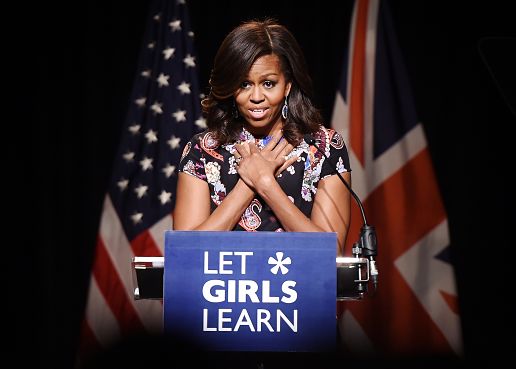
It is imperative that women are in positions of power, which is something that we still lack. Though Wollstonecraft envisioned women in the classroom, and women are continuously earning degrees, we are oppressed by the glass ceiling. In concordance with Wollstonecraft, present-day feminist Michelle Obama encouraged women to be educated as well as a means to escape patriarchal oppression. She stated, “When girls are educated, their countries become stronger and more prosperous” 3 to girls in Senegal. Michelle Obama has been vocal about thanking her own education for earning her the role of First Lady, and her work with Let Girls Learn has reached places further than the US.
There is a parallel between Obama and Wollstonecraft that exists centuries later; it is the same fight for global education in order to achieve equity with the white man. However, there is an insistence of hurdles women must compete with to get close to said status.
Women in Power: The Entertainment Industry
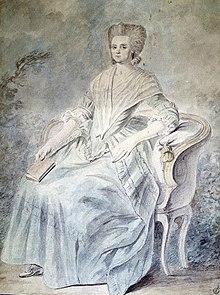
Olympe de Gouges is another suffragette that is arguably one of the first— if not the first— feminist in history. Her work, Declaration of the Rights of Woman and of the Female Citizen (1791), came a year before Wollstonecraft’s and also argues for equal rights. As stated by the Internet Encyclopedia of Philosophy, “Gouges’s writings share many themes with what would become classic texts in the feminist movement of the 20th century: independence of mind and body, access to political rights and political voice, education, and elimination of the sexual double standard” 4.
It is her “radical” work that would lead Madame de Gouges to be the only woman executed during the French Revolution. In her work she stated, “Woman has the right to mount the scaffold; she must equally have the right to mount the rostrum,” 5.
Olympe de Gouges struggled immensely to make a name for herself as a female playwright. She received a lot of backlash from men who thought that a woman’s place was likely in the kitchen. It was this backlash that further motivated her to continue her work, despite the constant oppression she received as a woman in the entertainment industry.
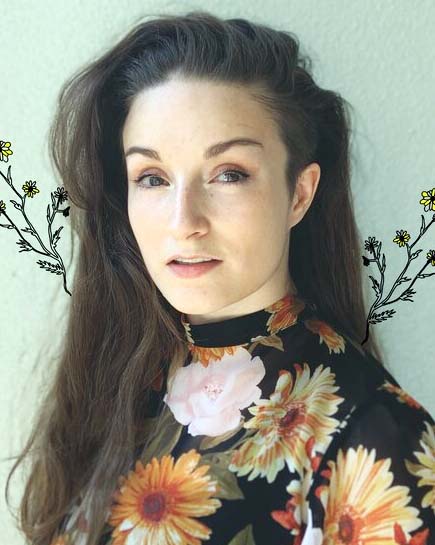
Shay Alexi also spoke about the struggle of “making it in a man’s world” in their poem, “Song of the Prettybird”. They stated:
Baby bird was pretty bird before pretty bird learned to pretty
And baby bird could compose whole symphonies… But the reviews came in
And they preferred apology
So she shrank
learned to make herself small enough
to nearly fit back in her eggshell
to tip toe atop eggshells.
Alexei Shay, “Song of the Prettybird” 6
In their writing, they talk about the shrinking women often experience when men belittle their work. Said prettybird became an eggshell of herself, tiptoeing around men, apologizing for herself in most instances and composing in the quiet what is acceptable of her.
“Song of the Prettybird” is overall an insightful poem about women’s worth often being reduced to their physical attributes. This is an occurrence common for women in the workforce, as they struggle to make ends meet under the male gaze. In the poem, men prey on women constantly for their beauty, creating barriers that should be absent and rarely exist for men. Men preying on women is not a new phenomenon or one of lesser occurance; however, women very rarely receive justice and as a result, we have recurring feminist movements like the #MeToo Movement asking for penalization.

Poets like Melissa Lozada-Oliva comment on how women are often unheard unless a man speaks up for them. Even when it comes to assaults, women are usually questioned as the perpetrator and are not believed; their traumas are put on trial, while the attacker goes away with a slap on the hand. Lozada-Oliva stated:
It’s like rapes happen all the time on campuses, but as soon as Jon Krakaeur writes about it, suddenly it’s like innovative nonfiction, and not like something girls are like making up for attention.
Melissa Lozada-Oliva, “Like Totally Whatever” 7
Not only are women not believed when they speak up about their attacks, but they are often shamed as attention-seekers; it is only when a man speaks up that their stories become nonfiction.
Men being able to speak up is also not something we’ve ever questioned; they’ve always had that privilege women can rarely afford. Lozada-Oliva said, “Declarative sentences, so-called, because they declared themselves to be the loudest, most truest, most taking up the most space, most totally white man sentences… Has only gotten in the way of helping them declare more shit about how they’ll never be forgotten like, ever.” 8 Men can always count on working hard equates success, whereas women are often in the shadows of mediocre men. Wollstonecraft and de Gouges saw themselves forgotten by The Big Six writers of the Romantic Period, all of whom are men.

It is imperative we follow the example of modern day women who do not stay silent; women from our past that also refused to stay complacent to the patriarchy, like Madame de Gouges or Wollstonecraft. Alexandria Ocasio-Cortez (AOC) stated, “I will not stay up late at night waiting for an apology from a man who has no remorse over calling women and using abusive language towards women.” 9 when verbally assaulted by fellow Representative Yoho. We must not take apologies but demand a change in behavior, and long lasting changes in the policies that protect our rights.
Beauty Standards
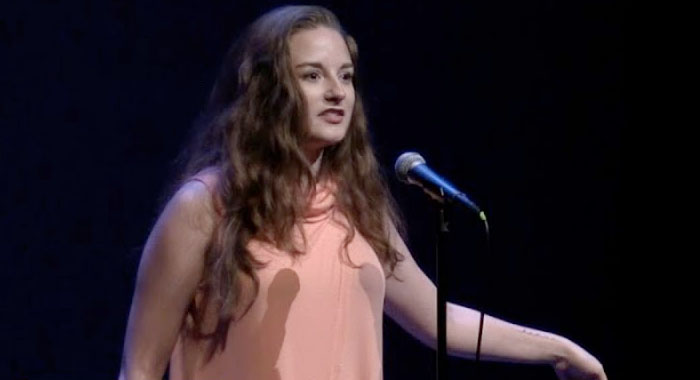
The cognitive correlation between beauty and value in women has not been completely eradicated over time. Women’s careers are often tied to pretty privilege and this beauty standard is set by the capitalist patriarch that promotes certain features over others. Men objectify and sexualize women for their gaze, then proceed to oppress them when women demand fair wages, justice, maternity leave, abortion rights, et cetera. Shat Alexi describes this feeling in her poem, stating:
When pigeon men track me across sky highway
They are happy to trace hungry orange eyes
between my pretty pretty bird features
too busy fantasizing
to poke fun at permanently preening pretty bird
my vanity is insanity unless it helps you get off
what a treat hosting eyes between my thighs.
Alexei Shay, “Song of the Prettybird” 10
Men “trace” hungry eyes over women, fantasizing, yet “poke fun” at our attempts to speak up, calling it insanity, unless “it helps you get off”.

Melissa Lozada-Oliva, in her poem “Like Totally Whatever” mentions how women are first judged by their beauty, and secondly their character. She stated:
“Tell them no one will take them seriously in a frilly pink dress. Or that make-up.”
Melissa Lozada-Oliva 11
Women are oftentimes caught in a double bind; they are not taken seriously in feminine clothing, but are mocked when they invoke masculine attributes to appear authoritative. The concept of gender in itself is highly propagated by the patriarchal need to control women at all times.

The constant pressure to be beautiful according to an ever-changing standard has led to a detrimental decline in women’s mental health. In A Vindication of the Rights of Woman (1792), Wollstonecraft said, “Taught from their infancy that beauty is woman’s sceptre, the mind shapes itself to the body, and roaming round its gilt cage, only seeks to adorn its prison.” 12 Hence, not only are our physical rights such as abortion or assault justice swept away from our hands, but our mental health becomes collateral damage. It induces low self esteem when we are not the standard, a constant search for validation that must only come from ourselves, mental disorders, among others. Wollstonecraft knew that we must first free ourselves from the standard and expectations set by men, and secondly, demand fairer opportunities.

Oftentimes, women’s voices are drowned in men’s own beliefs about how a woman should look or behave. In the workforce as well as family life there are expectations that must be met in order to qualify as a “good” woman. Lozada-Oliva states in her poem:
“Tell them they have a confidence problem. That they should learn to speak up, like the hyper-masculine words were always the first to raise their hands.”
Melissa Lozada-Oliva, “Like Totally Whatever” 13
We are constantly told what our behavior is meant to compose of; how to carry ourselves, present ourselves, and be anything but ourselves. It suppresses character and uplifts the mandates set by men. It teaches that masculinity and men are the only ones who exude confidence.

Shay Alexi wrote:
“But still she sang too loud
so they caged her up
and they said sign pretty lady sing
but I forgot how
So I said
pretty pretty bird bird look at my long clean coat
at my pretty pretty bird pretty pink legs
but they were bored of me.
Alexei Shay, “Song of the Prettybird” 14
In this passage, we are reminded that the woman is reduced to her beauty; that speaking up is “boring” to men. Once beauty is not enough, the men shall look away and detest what we stand for beneath our pretty long clean coat: universal rights.
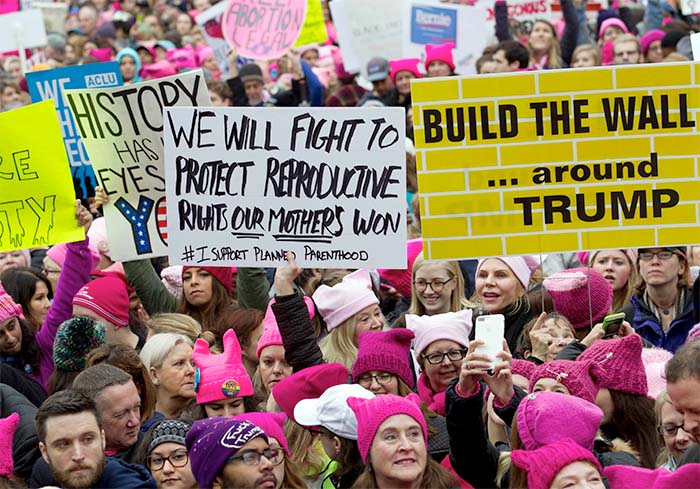
Feminism challenges these concepts and redefines what being a woman means. It even redefines manhood or masculinity, and gives men room to be themselves outside of the gender norms we’ve been so harshly cemented. The true purpose that mustn’t be forgotten is the goal of universal rights for every oppressed group that has yet to be equal or attain equity in comparison to the white man. It is this dream that united women like Wollstonecraft and de Gouges in the 18th century, and women today.
Works Cited
- Polwhele, Richard. “The Unsexed Females: A Poem, Addressed to the Author of The Pursuits of Literature.” The Broadview Anthology of British Literature: The Age of Romanticism, edited by Joseph Black et al., Broadview Press, 2018, pp. 191. ↩
- Wollstonecraft, Mary. “A Vindication of the Rights of Woman.” The Broadview Anthology of British Literature: The Age of Romanticism, edited by Joseph Black et al., Broadview Press, 2018, pp. 139. ↩
- Lazuta, Jennifer. “Michelle Obama to Girls in Senegal: You Are Role Models.” USA Today, Gannett Satellite Information Network, 27 June 2013, www.usatoday.com/story/news/world/2013/06/27/michelle-obama-senegal/2464411/ ↩
- “Olympe De Gouges (1748—1793).” Internet Encyclopedia of Philosophy, iep.utm.edu/gouges/ ↩
- “Olympe De Gouges (1748—1793).” Internet Encyclopedia of Philosophy, iep.utm.edu/gouges/ ↩
- ButtonPoetry. “Shay Alexi Stewart – Song of the Prettybird.” YouTube, 14 June 2016, www.youtube.com/watch?v=3xXRq5Pteew ↩
- “Melissa Lozada-Oliva – Like Totally Whatever.” Genius, Aug. 2015, genius.com/Melissa-lozada-oliva-like-totally-whatever-annotated ↩
- “Melissa Lozada-Oliva – Like Totally Whatever.” Genius, Aug. 2015, genius.com/Melissa-lozada-oliva-like-totally-whatever-annotated ↩
- Smith, Allan. “AOC Admonishes GOP Congressman in Fiery Speech: ‘I Am Someone’s Daughter’.” NBCNews.com, NBCUniversal News Group, 23 July 2020, www.nbcnews.com/politics/congress/aoc-admonishes-gop-congressman-fiery-speech-i-am-someone-s-n1234699 ↩
- ButtonPoetry. “Shay Alexi Stewart – Song of the Prettybird.” YouTube, 14 June 2016, www.youtube.com/watch?v=3xXRq5Pteew ↩
- “Melissa Lozada-Oliva – Like Totally Whatever.” Genius, Aug. 2015, genius.com/Melissa-lozada-oliva-like-totally-whatever-annotated ↩
- Bennett, Jonathan. “A Vindication of the Rights of Woman with Strictures on …” EarlyModernTexts, 2017, www.earlymoderntexts.com/assets/pdfs/wollstonecraft1792.pdf ↩
- “Melissa Lozada-Oliva – Like Totally Whatever.” Genius, Aug. 2015, genius.com/Melissa-lozada-oliva-like-totally-whatever-annotated ↩
- ButtonPoetry. “Shay Alexi Stewart – Song of the Prettybird.” YouTube, 14 June 2016, www.youtube.com/watch?v=3xXRq5Pteew ↩
What do you think? Leave a comment.











These classic poetry are manifesto of Western feminism.
Wollstonecraft was not sufficiently extreme in her call for women’s rights to fit the definition of feminism as it later evolved though.
International Womens Day is coming up soon. Will share this article to all my friends on the day of!
Reading those ancient poetry gives me that strange impression you sometimes get with essayists – of encountering a perfectly modern mind that is trapped in the past, looking around with modern sensibilities and baffled by what it sees.
Olympe de Gouges and Wollstonecraft are certainly powerful literary figures to be admire!
I love it when poetry takes me to another reality and makes me experience it with smells, sounds, fears and question marks.
I have seen videos of a few of Melissa Lozada-Oliva’s poems and liked them. Going to watch Shay Alexi’s work next.
Melissa has a way with mixing humour and emotion, so that I don’t know whether I wanted to laugh or cry at her words.
I believe poetry collections about, and written by, women of color should be celebrated.
This. I love how Melissa Lozada-Oliva puts everything on the page and it just speaks to you.
Love her. She evokes the trauma of colonialist white supremacist xenophobic misogyny!
I appreciated her message, and enjoyed the perspective – but really did not like her style of writing as a whole.
Good, modern, vibrant and arresting poetry should not contain cliches.
Clichés become clichés with time and use. What is a cliché for us now, it was not some time ago.
Great work. There are some really interesting feminist poet writers who are rising at the moment.
It’s terrific that young women writers are getting more exposure. But I do think they’re very similar, and pretty predictable, not just in the sentiments and tone of their writing, but because their work is so conservative in its mode of address, its assumptions about how we communicate in language and live and understand each other. It’s simplistic. Real poetry has to display some awareness of form. No matter how laudable the content, if there’s a lack of awareness of the possibilities of form, it will remain versified journalism, sociology, autobiography, or whatever.
There are many young women poets who are doing this – writing real poetry, that is poetry which is genuinely edgy.
Poetry is a minority interest, and that’s really not a problem.
This is quite exciting. I’ve learned about many notable women of the past that we were never taught about in history classes at school. Hopefully my daughter’s history classes will be a little less skewed than mine were.
Olympe de Gouges was fierceless in defending her political views against the “Terror” of Robespierre, and her patriotism was astonishing.
This woman deserves more attention in literature and history. Not only because she was one of the first feminists to reclaim political equality for women, but because she was an advocate of freedom. Therefore, she was not scared of speaking her mind and to challenge the political power in a period when you can get killed for doing so. She was brave, and she was pure because she believed in justice. Only for that, she has gained a place into my heart forever.
Vive Olympe!
My heart aches Olympe de Gouges, a wonder of our kind.
A Vindication of the Rights of Women is an important piece of literature in the feminist realm.
Some of Mary’s views, especially on women’s education, still stand true to some extent. Even in modern-day, we find some inequality in male and female education around the world.
I think Melissa is as a really interest artist and human being: honest af, funny, talented and generous.
Melissa and Shay are truly captivating poets.
Some of these poems feel so communal and so intimate/personal at the same time.
I agree. Like i am reading the author’s diary, and ashamed to have been caught reading it, but also knowing that it was intended for an audience.
It’s been a hot minute since I listened/read about to (slam) poetry, thanks for this!
These are the feminist canons!
I saw reference several times to Mary Wollstonecraft around International Women’s Day but I never read into her work until now. Thanks for the coverage.
There are – and have been for many years – a staggering array of impressive female poets!
While I knew about Mary Wollstonecraft, I did not know about Olympe de Gouges. Thanks for the rundown.
The English literary style of the late 1700s is not easily skimmed!
Anything prevalent in literature before the First World War can’t be skimmed at all.
Went to the same university as Shay Alexi. Damn, she is SO talented!
While this is very interesting, it’s also a bit all over the map. There is some odd phrasing, and the intent of the article is unclear. As I understand, an essay can have many sources, but an article would stick to three or less, unless the purpose is to compare different centuries writings on a topic.
It feels like the introductory chapter of a book.
Given the emphasis in the article on the importance of women of color in the fight for liberation, I’m a little surprised you didn’t mention the Combahee River Collective Statement. This was a document developed by Black feminists in the late 1970’s, which addressed the problems that women of color in particular were facing at the time. If you read it, you’ll see it actually invokes the very same themes that are still found in liberation movements today.
A very interesting read! It’s interesting to compare the ways in which women expressed themselves between in the 18th C and now – despite a lot of progress, we still face similar issues when it comes to social expectations. It would have been nice to have a little more variation in the subject of the contemporary poems, and a stronger link back to the initial subjects towards the end of the piece, but overall it was an insightful comparison of poetics.
An aside: I noticed the poet is referred to as Shay Alexi Stewart/Alexei Shay/Shay Alexi inconsistently throughout – is this due to changing pennames? Lovely poem nonetheless.
Nice work on Gouges who often gets left out of the history of ideas.
Good read, but Wollstonecraft was at times very condescending towards women.
Lizada-Oliva has a way of writing that reaches out and pulls you into her existence.
My new way of consuming poetry: read about it, then go on YouTube and watch the poet perform.
Some poems went over my head but there were a couple of lines I’ll take with me forever. Going to order their poetry collections.
Shay makes insanely beautiful poetry.
I wish I can understand the hidden meanings in English poetry.
Great article! I recently came across the Scottish poet Alison Cockburn who did not want her poems published under her name given the expected backlash. My supervisor tells me that this was an extremely common 18th century experience too. I wonder how many amazing female poets used pseudonyms because of this
Love learning about younger, contemporary poets. So important to celebrate these voices and discuss them in addition, or in conversation with, the older, male, lauded voices that dominate the history of poetry.
Love learning about younger, contemporary poets. It’s important to celebrate these voices and discuss them in addition–or in conversation with–the older, male, lauded voices that dominate the history of poetry.
Wow – what a great piece! I went to a women’s college and later transferred to a co-Ed school for financial reasons. The difference between the two institutions curriculum-wise was staggering – even during our study of the Wollstonecraft piece, people were badmouthing women’s colleges and education. In the year 2019!!!!!!! Unreal. While we’ve come a long way, it’s scary to think about how certain things just don’t seem to change.
I think this is great. I wonder if you’ve looked at Anna Laetitia Barbauld’s poetry, her “Epistle to William Wilberforce” (1791) is a really powerful abolitionist piece